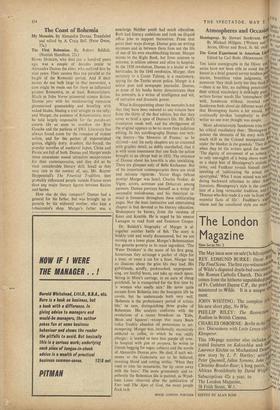The Coast of Bohemia
The First Bohemian. By Robert Baldick. (Hamish Hamilton, 21s.) HI NRI MURGER, who died just a hundred years ago, was a couple of decades junior to Alexandre Dumas the elder, who outlived him by nine years. Their careers thus ran parallel at the height of the Romantic period. And if their names do not bulk large in that movement, a case might be made out for them as influential pioneer Romantics, or, at least, Romanticisers. Much as Jules Verne pioneered science fiction, Dumas pere with his musketeering. romances glamourised gunmanship and brawling with naked blades, blazing a trail straight to the telly; and Murger, the patentee of Bohemianism, must be held largely responsible for the pseudo-art coterie life so soon to overflow the Rive Gauche and the purlieus of SW3. Literature has always found room for the romance of violent action, and for the pathos of impoverished genius, slightly dotty, drunken, slut-bound; the popular novellas of mediaeval Japan, China and Persia are full of both. Dumas and Murger made these avocations sound attractive escape-routes for their contemporaries, and they did so by their considerable literary skill. Small as they may rate in the context of, say, Mr. Rayner Heppenstall's 7-he Fourfold Tradition, they probably influenced people outside France more than any major literary figures between Racine and Sartre.
How else do they compare? Dumas had a general for his father, but was brought up in poverty by his widowed mother, who kept a tobacconist's shop. Murger's father was a concierge. Neither youth had much education. Both had literary ambitions and took on ill-paid office jobs to support themselves. From that point their ways diverge. Dumas goes on writing successes and in between them lives out the life of one of his own swashbuckling heroes. Murger moves to the Right Bank, but from mistress to mistress; is seldom solvent and often in hospital. In the 1830 revolution, Dumas is a leader at the barricades. In the 1848 revolution, Murger, then secretary to a Count Tolstoy, is a reactionary, spying for the Tsarist secret police. Murger is a minor poet and newspaper journalist. Dumas, as none of his books better demonstrates than his memoirs, is a writer of intelligence and wit, of narrative and dramatic power.
What is disappointing about the memoirs is not that they have been reduced to one volume here from the thirty of the first edition, but that they cover so brief a span of Dumas's life. Mr. Bell's translation reads well, and his abridgement of the original appears to be no more than judicious editing. In this autobiography Dumas was writ- ing history—`the Memoirs of France,' as he claimed--and the early chapters are so crammed with graphic detail, so deftly marshalled, that it is with some resentment that one finds the action brought to an abrupt halt in 1832. The reticence of Dumas about his love-life is also tantalising. There are glimpses only of Belle Krelsamer. But of his important contemporaries there are vivid and intimate vignettes: Victor Hugo (whose protegd Murger was later), Charles Nodier, de Vigny, actors, actresses and Delacroix among painters. Dumas portrays himself as a writer of successful melodramas, and his theatrical in- stinct is foremost throughout these exhilarating pages. Not the least instructive and entertaining chapter is that devoted to his literary education. Shakespeare he knows, from the versions of Kean and Kemble. He is urged by his mentor Lassagne to read Scott and Fenimore Cooper.
Dr. Baldick's biography of Murger is al- together another kettle of fish. The story is briskly told and neatly documented, but we are moving on a lower plane. Murger's Bohemianism has genuine poverty as its main ingredient. 'The Water Drinkers' is the name of his first gang. Sometimes they scrounge a packet of chips for a treat, or roast a cat for a feast. Murger has no illusions about the grim life they lead. His girl-friends, scruffy, pockmarked, unpreposses- sing, are fearful bores, and take up much space. Sitting in Mimi's carriage, in an aura of cheap patchouli, he is transported for the first time by `a woman who smells nice.' He never quite escapes from Bohemia into the bourgeois life he covets, but he understands both very well. `Bohemia is the probationary period of artistic life,' he says, distinguishing three grades of Bohemian. His analysis conforms with the revelations of a recent broadcast on 'Yobs, Beats and Squares': -except that many Beats today frankly abandon all pretensions to art- mongering. Murger was, incidentally, excessively addicted to coffee, to which he was oddly allergic: it tended to turn him purple all over. In hospital with pox or purpura, he writes to friends begging for sugar, tobacco and the novels of Alexandre Dumas pere. He died, if such wit- nesses as the Goncourts are to be believed, sweating blood and rotting within. 'When they tried to trim his moustache, the lip came away with the hairs.' The more gruesomely and re- pellently the Bohemian life is painted, as Wynd- ham Lewis observed after the publication of Tarr and The Apes of God, the more people flock to it,
HUGH GORDON PORlIEUS






































 Previous page
Previous page